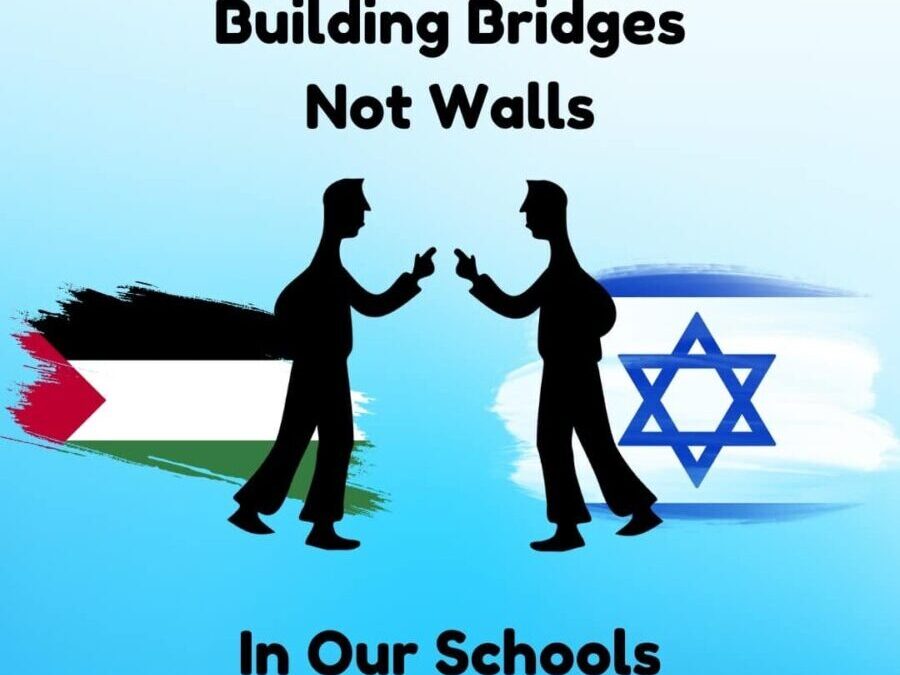Israel-Palestine Conflict Creating Fear, Confusion and Opportunities for Learning
In the often-turbulent landscape of modern classrooms, navigating discussions on the Israel-Palestine conflict is like crossing a political minefield. With the media spotlight glaring and protests echoing globally, young people are increasingly drawn to this complex issue, propelled by enthusiastic debates, passionate activism, and often anger.
Despite the relevance and urgency of this topic, some teachers and teaching assistants shy away from classroom discussion. Supply teachers particularly can fear the repercussions of stirring political sensitivities within a classroom which they are only visiting for a short while. However, avoidance not only prevents intellectual discourse but also deprives young people of crucial opportunities to engage in constructive dialogue. Avoidance can thereby perpetuate the cycle of echo chambers, misinformation, and hatred cultivated by biased news sources.
Social Media inaccuracies and conflict prejudice
Complicating matters further, the use of smartphones grants young people immediate access to an ocean of information. Social media posts can be polluted with inaccuracies and strong prejudices. Anti-Semitic and Islamophobic content flood online spaces, blurring the line between legitimate discussion and hate-fuelled rhetoric. Even those without explicit biases may unintentionally encourage harmful narratives, fuelled by unchecked emotions, misinformation, and peer-to-peer influence. It is better young people understand that bias is as natural as anything about us as humans; our experiences shape ideas and assumptions we can carry our whole lives unless we take the time to unpack, understand, and deconstruct them.
Israel-Palestine Conflict where do teachers begin
In such a charged atmosphere, the need for mature and responsible behaviour is more pressing than ever. Rather than young people succumbing to entrenched ideologies and assigning blame, educators model constructive dialogue and critical thinking building bridges for their students. By encouraging an environment of mutual respect and intellectual curiosity, we can equip the next generation with the tools to navigate complex geopolitical issues with empathy and understanding.
Modelling constructive dialogue and empathy
Creating a constructive environment for meaningful discussion amidst the complexities of the Israel-Palestine conflict requires a deliberate and consistent approach. A good start is to establish a framework grounded in shared values and a commitment to respectful discourse, educators cultivate a culture of listening, reflection, and appreciation for diverse perspectives. Central to this framework is the promotion of specific behaviours as examples of civility and constructive engagement. Encouraging young people to listen attentively and respectfully to one another, fosters empathy and understanding.
Furthermore, acknowledging and validating young peoples emotions, fears, and concerns creates a supportive environment where diverse viewpoints can coexist peacefully. Emphasising that it is acceptable to disagree respectfully with each other’s ideas, showing that kindness and empathy can coexist with differing opinions. It is essential to resist the impulse to change or correct others’ viewpoints. Instead, educators encourage students to sincerely listen to one another, and first seek to understand the underlying reasons behind differing perspectives.
Encourage factual evidence and discourage negative emotion
Promoting the use of factual evidence to support arguments encourages critical thinking and discourages reliance on emotional rhetoric. It is crucial to shift the focus from attacking individuals to creating a space where young people feel empowered to express their viewpoints without fear of personal criticism. By reframing debates as opportunities for learning rather than winning, educators encourage intellectual curiosity and growth. Additionally, establishing common ground by defining terms and drawing connections between past events and present realities helps young people contextualise the conflict and appreciate its complexities. This approach encourages young people to engage with history and current events in a meaningful way, fostering a deeper understanding of the issues at hand. By establishing and fostering these values in the classroom, educators empower young people to make positive, solutions-focused contributions to discussions on the Israel-Palestine conflict, equipping them with the tools to navigate the complex geopolitical issue.
You can’t change the Israel-Palestine conflict from your classroom
While these strategies offer valuable guidance for navigating discussions on the Israel-Palestine conflict, it’s essential to recognise the inherent complexity of the topic. As educators, we cannot be expected to delve into the depths of such intricate geopolitical issues within the confines of a classroom setting. Moreover, young people should not feel burdened with the responsibility of single-handedly resolving global conflicts from their desks.
Where to go for support and solutions
If your school or classroom finds itself navigating sensitive territory and encountering division because of discussions surrounding the conflict, there are organisations and resources available to provide support and guidance. One such organisation is Solutions Not Sides (SNS), which aims to address issues of Antisemitism, Islamophobia, and polarisation related to the Israeli-Palestinian conflict in the UK. SNS, posses extensive expertise and experience in teaching students about the Israel-Palestine conflict in a manner that promotes dialogue, empathy, and conflict resolution. Their approach emphasises creating safe spaces for discussion and fostering understanding among students with differing viewpoints.
Further exploration and insight
Understanding the complexities of the Israel-Palestine conflict and strategies for facilitating constructive dialogue are so important. Schools can be a safe place to explore understanding and tolerance and the following articles give useful insight.
1.” Discussing Israel-Palestine: Creating Sage and Compassionate Spaces for Learning”: https://solutionsnotsides.co.uk/blog/2021/10-points-creating-safe-spaces-discuss-israel-palestine
2. “Don’t Let Middle East Violence Fuel Hatred on the Streets of Britain”: https://www.theguardian.com/commentisfree/2021/may/22/dont-let-middle-east-violence-fuel-hatred-on-the-streets-of-britain
3. “Israel-Palestine: Understanding Triggers during dialogue”: https://solutionsnotsides.co.uk/blog/2022/guide-israel-palestine-trigger-words-during-dialogue
To find out more about 4myschools and how we may help you with your teaching career click here

